
News + Trends
"Squid Game": David Fincher plans US spin-off for Netflix
by Luca Fontana

Squid Game never promised that everything would turn out fine in the end. Instead, it left behind a much more valuable legacy. A story about humanity – and how difficult it is to preserve that in an inhumane world.
Beware: this opinion piece contains spoilers for all three seasons of Squid Game.
Gi-Hun clings to the baby like it’s the last bastion of goodness. His hands tremble with exhaustion. His face is etched with fatigue. He’s seen too much. Lost too much. But he could still win. Now. His final opponent barely weighs three kilos, is helpless, mute and wrapped in a bloody overall. He no longer has to face an obstacle. Nor a danger. Just one last act of selfishness.
But Gi-Hun hesitates.
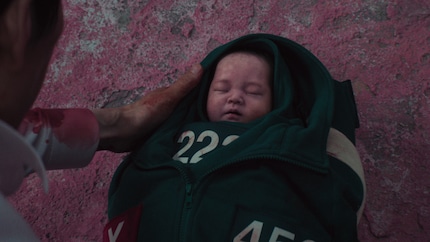
«We are not horses,» he says, quietly, countering the words once hurled at him by the Front Man as a threat. Then he raises his head. «We are humans.»
He gently places the baby on the floor, where no one can step on her. Where nobody can force her to be part of the game. Suddenly, the tiredness disappears from Gi-Hun’s face. All that’s left is a stoic clarity. Gi-Hun turns around. Rather than looking into the deadly abyss gaping before him, he turns his back on it.
«And humans are…»
He then lets himself fall backwards, ending the game.
I’m gobsmacked. I feel empty. Sad. Confused. As I try to come to terms with the death of the protagonist who’s carried us through Squid Game for years, I’m left asking myself, «Okay, humans are…what?»
Squid Game started in 2021 as a treacherous parable of a world eaten away by greedy capitalism. A mirror of a system that turns people into enemies under the guise of free choice. Participate, and you’ll be in with a chance to win billions. Opt out, however, and you’ll lose everything. Not only the game, but your life too.
The first season was all about the mechanics of the game. How does the system work? Who’s behind it? And how far will people go when they have nothing left to lose? The answers were shocking. But they were also revealing. Like the VIPs in the series, we viewers watched with fascination to find out whether the participants would be prepared to sacrifice their humanity if their survival depended on it. And see where they’d draw the line.
At the same time, the series expressed something many people had been feeling for a while: that a human being’s value is no longer measured by their dignity, but by the extent to which they can be used. Squid Game creator Hwang Dong-hyuk said the series echoed South Korean industrial history – its journey from military dictatorship to export nation, bloody uprisings to neoliberal globalisation. In the midst of the country’s rapid rise, there were winners and losers. People who never had a fair chance. Elderly people. Migrants. People in debt. The displaced.
People like Gi-Hun.
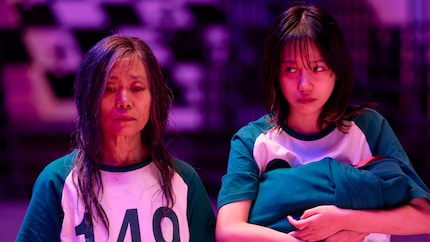
In seasons 2 and 3, the game remains the same, but the perspective changes. Sure, the rules are clear. If you win, you live. If you lose, you die. Some claim the series is repetitive. If you ask me, anyone who thinks Squid Game 2 and 3 are just «more of the same» isn’t thinking hard enough. In the second and third season, the focus shifts from the «how» of the system to the «what» it does to us. It’s about the price we pay to survive. About what remains of us.
Or rather, what we lose along the way.
The battle for the soul of humanity isn’t fought with weapons – even if it’s all blood and bullets at first. Instead, it takes the form of two competing convictions: that of the Front Man and that of Gi-Hun. Both played the game. Both survived. But only one of them remained human.
In-ho, the current Front Man, isn’t a villain in the traditional sense. Rather than being driven by power or fame, he’s spurred on by desperation. By what putting his faith in goodness has cost him. First, he lost his wife and child. Then, he too began to fall apart. First during the game, then outside of it. We see this in brief flashbacks. Slowly. Little by little. That’s exactly how people go down, isn’t it? Step by step.
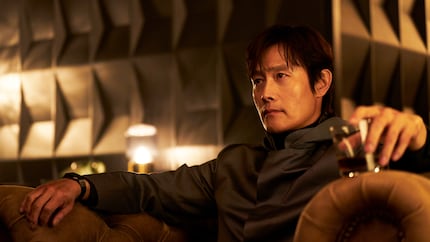
There’s no doubt about it: the Front Man has seen hell and decided hope has no place in it. The question he constantly asks Gi-Hun, «Do you still have faith in people?», isn’t a provocation. It’s a mirror. In-ho gave up his faith in people a long time ago. And he’s desperately looking for someone to prove that he was right – if only to avoid admitting to himself that he potentially could’ve chosen a different path.
Gi-Hun, however, refuses to give him that confirmation. He remains a disruptive element in In-ho’s world view. Because he doesn’t become numb. Because he doesn’t go along with things. Because, despite everything, he still believes everything will work out in the end. Perhaps In-ho once thought the same way. Maybe he would’ve made different decisions if he’d had people around him like Gi-Hun did in season one. Ali. Sae-byeok. Il-nam. Friends who saved him – until he lost them.
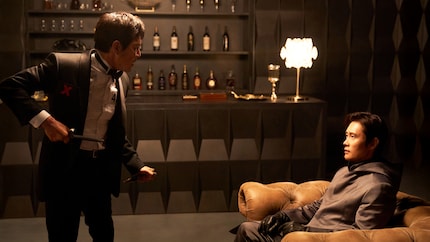
In the end, it’s Gi-Hun’s sacrifice for the baby that causes something inside In-ho to waver. He hasn’t changed. Not yet. But he’s rattled. A crack appears in the armour he’s built over the years. Perhaps he’d lost himself long ago. Maybe he’d never truly gone. Either way, somewhere deep inside him, something flickers for a moment. A memory of what he once believed in. Of what he once was.
This flicker accompanies him all the way to Los Angeles. The place where he hands over Gi-Hun’s remaining prize money to his daughter. And right there, in the garishly lit streets of a country that considers itself the leader of the free world, he realises with a tinge of disgust that the game crossed the ocean a long time ago. The new recruiter – played by Cate Blanchett – is already on the prowl. New victims. New games.
New masks.
Gi-Hun could’ve been the hero who ended it all. The one to break the system, expose the VIPs and stop the cruel games once and for all. It would’ve been the classic hero’s journey we’re all familiar. Luke Skywalker detonating the Death Star with a single shot.
But Squid Game isn’t Star Wars. And Gi-Hun isn’t a saviour. In the world of Squid Game, a single shot is never enough. There’s no hitting the centre. No triumph. The system’s just too extensive, too well conceived and, at the end of the day, too firmly embedded into society. Too many people profit from it. Too many people watch it happen.
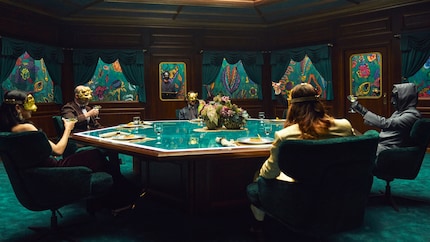
The series makes no secret of this. It shows us a version of humanity that’s become entangled in all its contradictions. In power, powerlessness, hope and self-abandonment. Gi-Hun’s also caught up in this. He fails too. He, who once had integrity, actually turns into a strategist at the end of season two. Starts a riot. Plays the game as if he’s been part of it for a while, then allows himself to be guided by revenge after his failure. It’s a single act – but it’s a breaking point, a guilt that tears him apart inside.
Maybe that was the moment he lost. Not the game, but himself.
Unlike the Front Man, however, Gi-Hun doesn’t get stuck. As others meet their downfall, he searches for a way out. Not out of the system, but out of the spiral that almost destroyed him. It’s no coincidence that he ends up holding on to his humanity. It’s a decision against the game. A rebellion against a system that propagates survival at all costs.
And that’s the very answer he gives to his final, unfinished question. Not in words, but in his final act of self-sacrifice.
So, what are humans then? Above all, humans are one thing: imperfect. They fail, they break, they lose themselves. But they can also find their way back. Make amends. Kindle a sense of hope when all seems lost. Not because they’re strong, but because they make a choice. They choose goodness. Life. Other people.
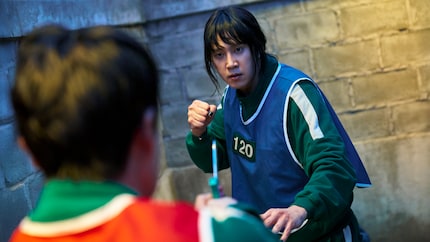
Maybe we can’t stop the game. Maybe there’ll always be new VIPs. New masks. New recruiters. But as long as there are people who decide not to play along, all is not lost. Gi-Hun’s sacrifice may not have been a victory over the system, but it was an act of humanity – against all odds.
Maybe that’s enough.
I write about technology as if it were cinema, and about films as if they were real life. Between bits and blockbusters, I’m after stories that move people, not just generate clicks. And yes – sometimes I listen to film scores louder than I probably should.
This is a subjective opinion of the editorial team. It doesn't necessarily reflect the position of the company.
Show all